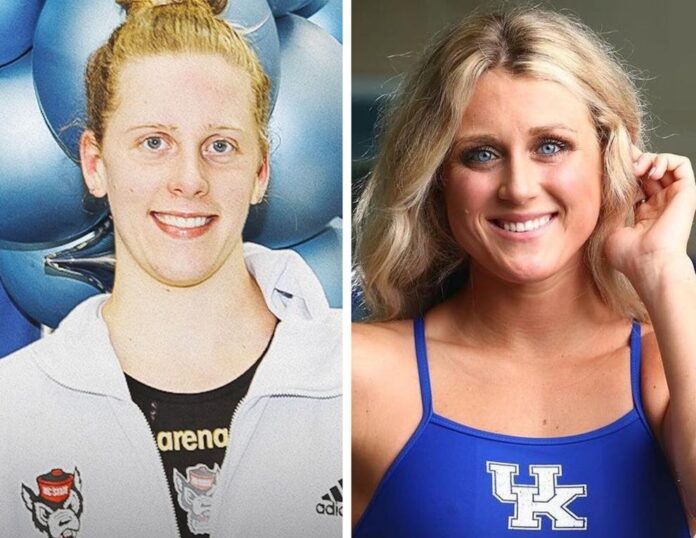(The Center Square) – A swimmer who competed at N.C. State is among 16 collegiate athletes, including 12-time All-American Riley Gaines, suing the NCAA for letting men who say they are women compete against them and use the same locker rooms.
Kylee Alons, a two-time national champion and 31-time All-American for the Wolfpack, in the summer of 2023 told her story of being forced to share a locker room and “compete against a male athlete” at the NCAA championships. In a social media post last September, she wrote, “I’ll be the first to admit that speaking up about this issue is hard, but it is essential to protect women’s privacy, safety, and integrity of competition.”
Gaines, who competed at Kentucky, and Pennsylvania swimmer Paula Scanlan have led the effort nationally to save women’s sports. Gaines was at the North Carolina General Assembly last summer as lawmakers passed Fairness in Women’s Sports Act, legislation initially vetoed by Democratic Gov. Roy Cooper but later put into law by a veto override.
The litigation, a 156-page filing on Thursday in the U.S. District Court for the Northern District of Georgia, Atlanta Division, says the NCAA and event host Georgia Tech knew they were in violation of Title IX. That’s the 1972 landmark statute guaranteeing equal opportunities for men and women in programs and activities that receive federal financial assistance.
The suit includes four unnamed athletes, two who competed in Division I swimming, the others in Division II volleyball and Division III track. Also in the suit with Alons and Gaines are Olympian swimmer Reka Gyorgy of Virginia Tech; Kentucky swimmer Kaitlynn Wheeler and tennis schoolmate Ellie Eades; soccer and track athlete Ainsley Erzen of Arkansas; and six swimmers from Virginia’s Division III Roanoke College – Lily Mullens, Kate Pearson, Susanna Price, Carter Satterfield, Katie Blakenship and Julianna Morrow.
Alons is from Raleigh, Satterfield from Cary and Morrow from Mooresville.
In a statement, the NCAA said, “College sports are the premier stage for women’s sports in America, and while the NCAA does not comment on pending litigation, the Association and its members will continue to promote Title IX, make unprecedented investments in women’s sports and ensure fair competition in all NCAA championships.”
Bill Bock, who resigned from the NCAA Committee on Infractions last month, is lead attorney in the class-action suit. He’s a former U.S. Anti-Doping Agency general counsel. The Independent Council on Women’s Sports, commonly known as ICONS, is providing funding.
In a release, ICONS co-founder Marshi Smith said, “This lawsuit against the NCAA isn’t just about competition; it’s a fight for the very essence of women’s sports. We’re standing up for justice and the rights of female athletes to compete on a level playing field. It’s about preserving the legacy of Title IX and ensuring that the future of women’s sports is as bright as its past.”
“We’re sending a clear message,” said ICONS co-founder Kim Jones. “The integrity of women’s sports is nonnegotiable.”
Alons gave insight to what happened at the 2022 NCAA championships in an interview with Outkick, and later met with U.S. Rep. Greg Steube, R-Fla. Lia Thomas, previously a swimmer for the Penn men’s team three years, was using the same locker room as the women and Alons opted to change in a storage closet instead of the same locker room with Thomas.
Her Wolfpack teammates did likewise.
Alons, in the release, said she doesn’t want another woman to be exposed to the same situation she faced.
“The NCAA has put women in an impossible situation both in competition and in the locker room,” she said.
In a U.S. Senate hearing in June, Gaines at one point countered Sen. Dick Durbin, D-Ill., saying, “Senator Durbin, in your opening statement you had mentioned this rhetoric, you mentioned ‘what message does it send to trans individuals?’ and my combat to that is what message does it send to women, to young girls who are denied these opportunities? So easily their rights to privacy and safety thrown out the window to protect a small population, to protect one group as long as they’re happy. What about us? That is the overall consensus of how we all felt inside that locker room.”




